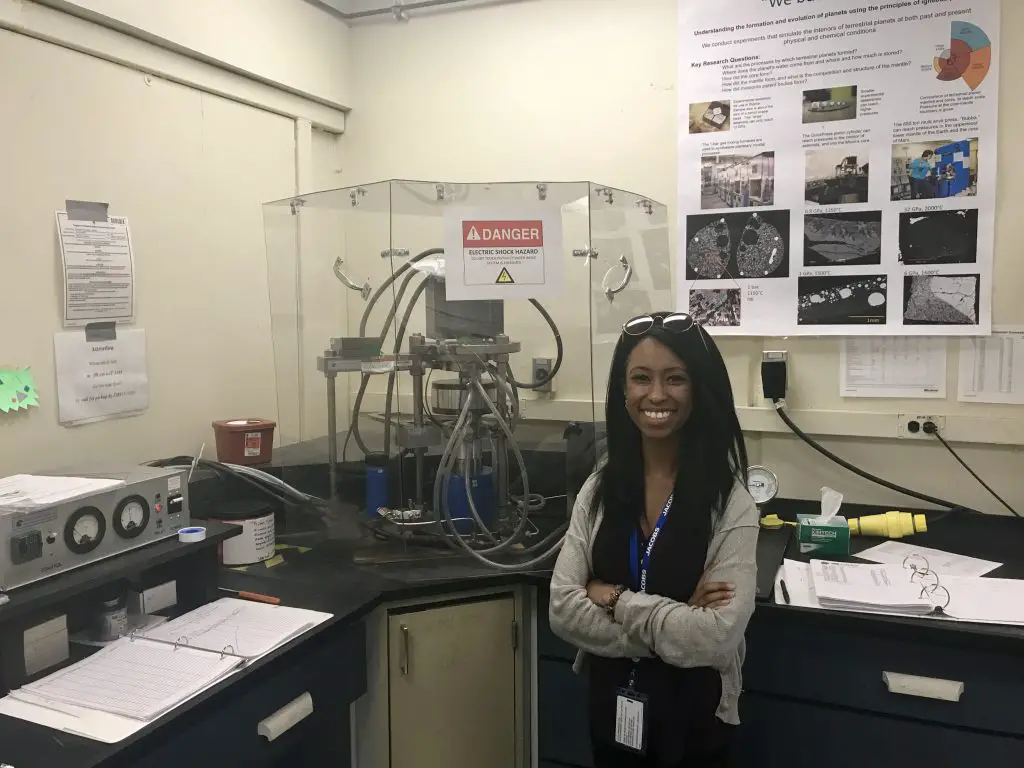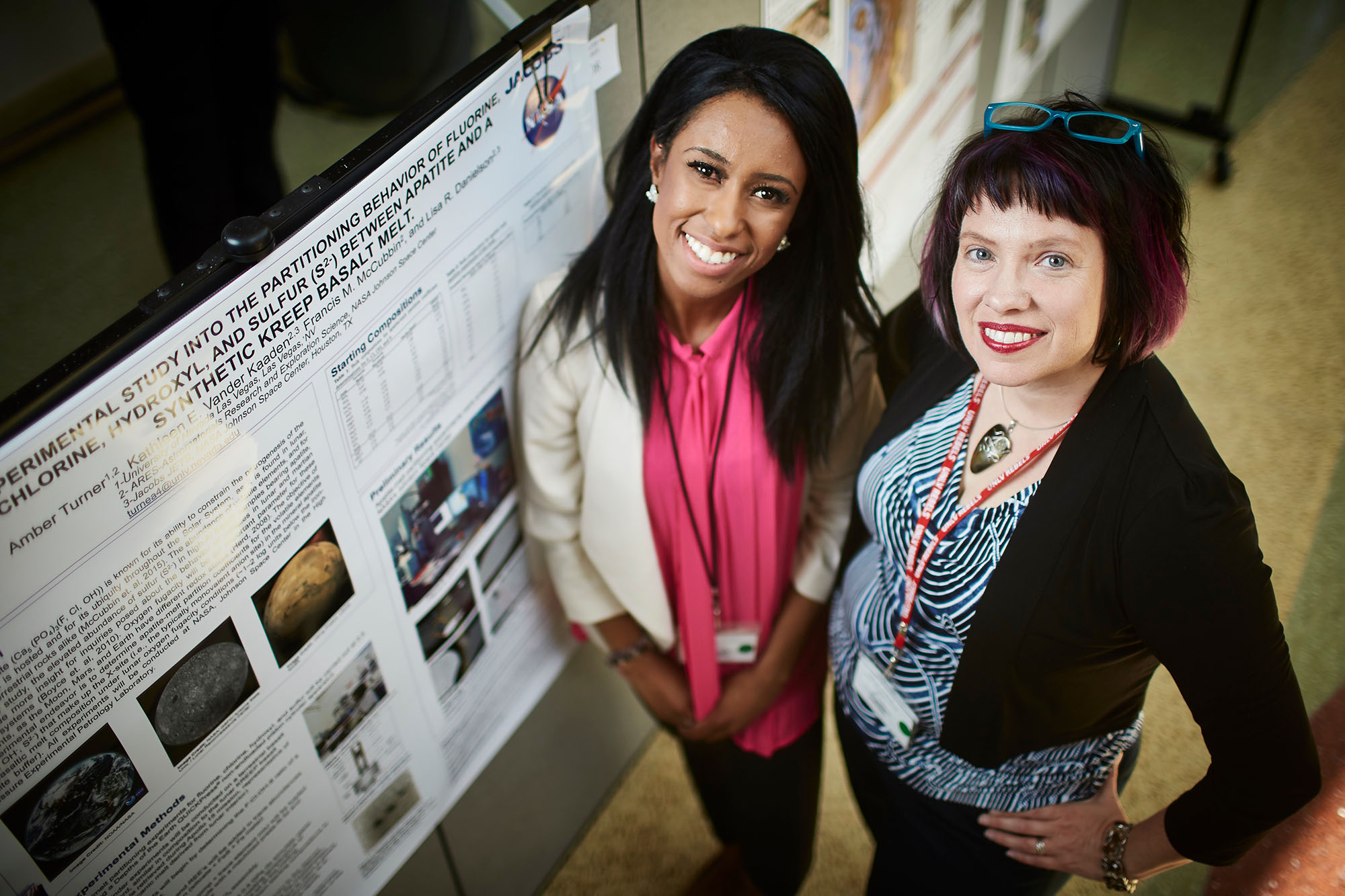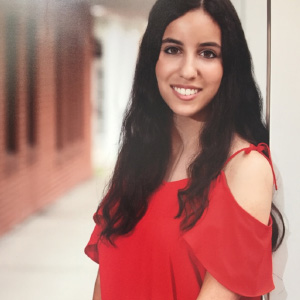Amber Turner, a twenty-two-year-old undergraduate student at the University of Nevada, Las Vegas, is probably busier than you. Turner, a first-generation minority student, is a senior studying Geology who put her collegiate studies on hold to partake in an eight-month internship working for NASA from January 2017 until August 2017.
Her NASA internship at the Johnson Space Center in Houston, Texas, came after other geology research opportunities, such as working with Professor Oliver Tschauner and interning at Lawrence Livermore National Laboratory, both endeavors that her focus on the field of planetary geology on high-pressure and high-temperature petrology has helped her land. On top of that, she serves in the United States Army Reserve, where she works as a civil affairs specialist. And of course, this load comes intermixed with other collegiate activities and part-time jobs.
Looking Beyond: Turner’s Planetary Geology Research
As an undergraduate senior who already has so much professional, paid work experience, Turner has been afforded the opportunity to conduct a substantial amount of research. Taking a break from her academic studies, Turner has embarked on an eight-month internship at NASA, working in the Johnson Space Center in Houston, Texas, where she will be studying geologic processes on Mars and the moon.
Working at a big-name research facility such as NASA, which leads the world in space exploration, is an opportunity many people only dream of getting. Of course, obtaining an internship at NASA is no easy feat. NASA receives so many applications that many very qualified, intelligent individuals get turned away. So, what made Amber Turner stand out from the rest? How was she able to get nearly every outer space researcher’s dream job? Turner believes her proven record of substantial research on high-pressure science certainly helped, along with her work experience. “When presenting the research from the experiments I did at the Lawrence Livermore National Lab, I met Dr. Lisa Danielson, who was in charge of the intern program for Jacobs, the contractor that I am working for at NASA,” she says. “And she encouraged me to apply for her program in high-pressure science as well.”

Turner’s success seemed to form like a snowball, one opportunity leading to another, then to another, each one arguable bigger and better than the previous one. “I got the NASA internship by studying high-pressure, high-temperature geology,” she explains. “At my university, I work for the High Pressure Science and Engineering Center, under my mentor, Dr. Oliver Tchauner.” Turner began working with Dr. Tchauner on experiments to understand meteorite activity, including how minerals transition in high pressure, high temperature phases. From working with him, she got an internship at Lawrence Livermore National Laboratory last summer–the internship she credits for helping her obtain her current position at NASA.
Turner is currently studying the geologic processes on Mars. “In order to do that, I do research on meteorites,” she says. “I don’t touch the meteorites specifically. The meteorites are retrieved in Antarctica, and they are analyzed, and then what I do–and what experimental petrology does–is create a synthetic composition, or a synthetic form, of those meteorites that were retrieved, and we run experiments on them. By doing these experiments, we can understand what geologic processes happen on Mars and basically the geologic history of the planet by studying the synthetic composition of the meteorite.”
Finding a Purpose: Serving Her Country
Turner didn’t finish high school knowing exactly what it was she wanted to do in life. In her early college years, she struggled to find her passion. She started off at UNLV as an International Business major. That, however, didn’t last long. “I didn’t like it, it didn’t fit my personality, and I honestly felt like it just wasn’t my path in life,” she says. “And so I started taking environmental science classes and different electives to see what it was that I was interested in.
Turner enjoyed environmental science but still didn’t feel that it afforded her a clear direction in life, and the sense of aimlessness was troubling for her and left her feeling lost. The desire to find a purpose led Turner to approach a military recruiter. “I joined the Army in March 2014, and what motivated me was trying to find a purpose. I actually went to a recruiter and started the process of joining the army so I could have more of a sense of direction in my life.” Even once she found that direction as a hopeful planetary geologist, however, Turner continued to serve in the United States Army Reserve.
Turner maintains a civil affairs specialist position in the Army.“The textbook definition of my job is the liaison between the United States Army and the foreign populace,” she says. “So, what we do is a lot of foreign humanitarian assistance missions. If there is an earthquake, we go respond to it and help out with that, or if there’s a need for population resource control, we go help out with that.” Turner completes her job once a month, and she also spends several weeks training each summer. She hasn’t deployed yet, which is why she is still a reservist.
While most summers as a reservist are spent taking refresher classes, Turner spent this summer training in a different way for the United States Army Reserve. “This summer was actually different, because I went away to a school to help me become a sergeant,” she says. “I am not a sergeant yet, but, I attended a school at the Noncommissioned Officers Academy in California so I could learn how to become one.”
Future Plans: Post-Graduation
Turner is planning on graduating from the University of Nevada, Las Vegas, at a later date than she had originally anticipated, due to her work. She will graduate in fall 2018. When she enrolls in courses again at UNLV, it will be as a senior.Turner has given a lot of thought to her post-graduation plans, which include continued work for both NASA and the United States Army.
“I am definitely hoping to work for NASA full-time,” she says. “I absolutely love Jacobs, the contractor that I am working for here at NASA…I’ve gained so much for my professional career as a scientist, and I’ve definitely gained a lot of knowledge as an early-career scientist that I feel I would not have gained elsewhere.” So, as Turner put it, her Plan A is to apply again for an internship next summer, and to just hopefully keep coming back until she works there.
Turner also plans to continue serving in the Army; in fact, she has been thinking about becoming an officer while also pursuing her career as a planetary geologist. “I definitely want to stay long term in the Army,” she says. “Luckily, I’ve come to find that a lot of national labs are very veteran-friendly, and being here at NASA, they really celebrate the fact that I serve my country, and I’ve been told that if I were to work for them permanently, that it would be absolutely no problem if I got called to serve or deployed, and any training that I would have to go to wouldn’t interfere with my career as a scientist…It’s awesome that I can have the best of both worlds.”

















